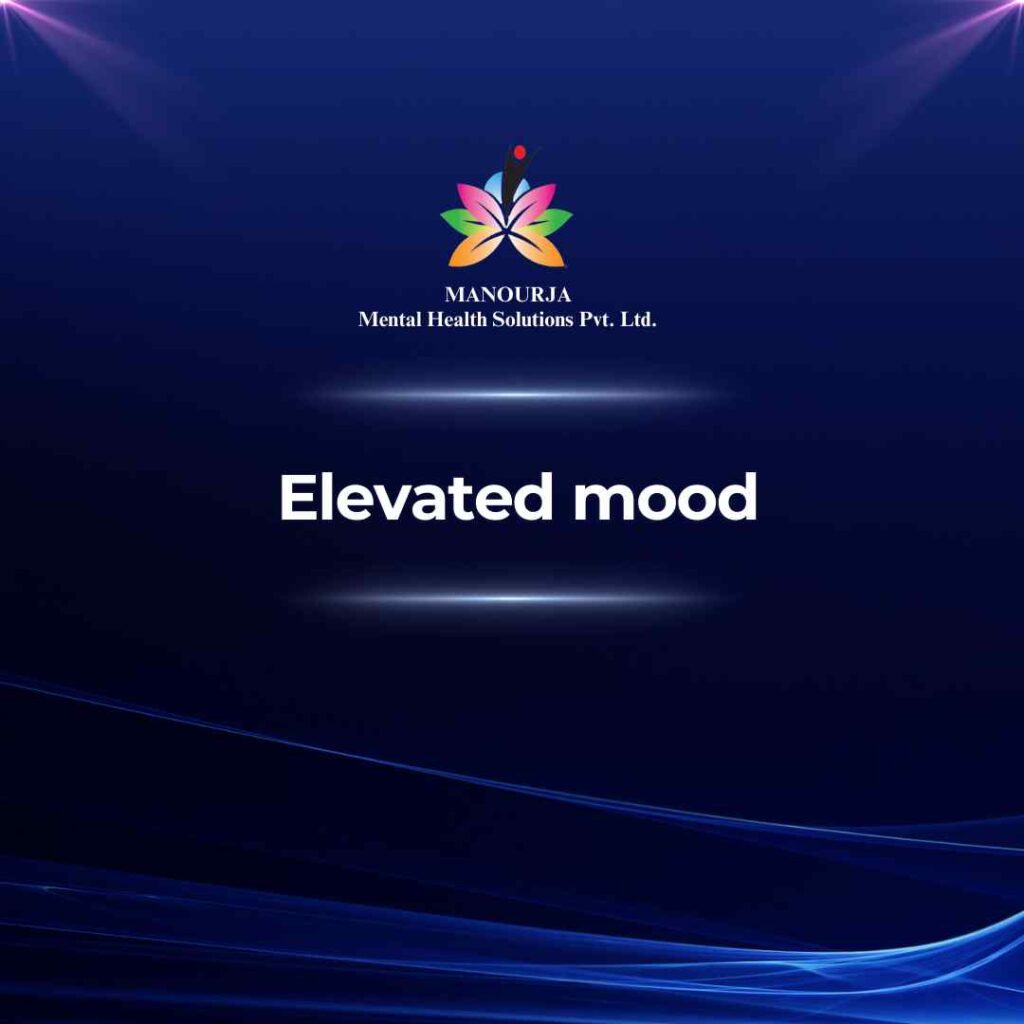Elevated Mood

Elevated mood refers to a state of heightened emotional well-being and increased energy that goes beyond normal levels of happiness or contentment. While a positive and elevated mood is a normal part of human experience, when it is excessive, inappropriate to the situation, or sustained over a long period, it can be a sign of a mental health condition. Elevated mood can manifest as euphoria, intense joy, or irritability, depending on the individual and the context.
Elevated Mood as a Sign and Symptom of Mental Illness
When elevated mood appears as a symptom of mental illness, it is often characterized by a significant departure from the person’s usual mood and behavior. It can lead to impulsive decisions, reduced need for sleep, increased talkativeness, and heightened activity levels. Elevated mood in the context of mental illness can be disruptive to daily functioning and interpersonal relationships.
Mental Illnesses and Conditions Associated with Elevated Mood
Bipolar disorder is the primary condition associated with elevated mood. During manic episodes, individuals experience abnormally elevated mood, energy, and activity levels. This can lead to risky behaviors, impulsive decisions, and difficulty functioning in daily life. Hypomanic episodes, a milder form of mania, also involve elevated mood but to a lesser degree.
Cyclothymic disorder is a milder form of bipolar disorder characterized by chronic mood fluctuations. Individuals with this disorder may experience periods of elevated mood (hypomanic symptoms) that alternate with periods of mild depression. These mood changes are less severe than in bipolar disorder but can still impact daily functioning.
Schizoaffective disorder combines symptoms of schizophrenia and mood disorders. Individuals with this condition may experience elevated mood during manic or hypomanic episodes, along with psychotic symptoms such as hallucinations or delusions.
- Substance-Induced Mood Disorder
Substance-induced mood disorder occurs when the use of drugs or alcohol leads to significant mood changes, including elevated mood. Substances such as stimulants (e.g., cocaine, methamphetamine) can cause temporary euphoria and increased energy, mimicking the symptoms of mania or hypomania.
While borderline personality disorder is more commonly associated with mood swings and emotional instability, individuals with BPD can experience periods of elevated mood. These episodes may include intense feelings of happiness or excitement, often in response to specific triggers or interpersonal events.
- Attention-Deficit/Hyperactivity Disorder (ADHD)
In attention-deficit/hyperactivity disorder, particularly in adults, periods of elevated mood can occur, though they are not as extreme as in bipolar disorder. These episodes might be marked by increased energy, impulsivity, and hyperactivity.
In some cases of obsessive-compulsive disorder, individuals may experience brief periods of elevated mood upon completing a compulsion or ritual, leading to temporary relief and heightened emotions.
While generalized anxiety disorder is primarily characterized by persistent anxiety and worry, individuals might experience short-lived episodes of elevated mood, particularly when anxiety temporarily subsides or in response to perceived achievements or resolutions of worries.
Conclusion
Elevated mood can be a significant indicator of various mental health conditions when it occurs inappropriately or excessively. Recognizing and understanding elevated mood within the context of these disorders is crucial for accurate diagnosis and effective treatment. Managing conditions associated with elevated mood often involves a combination of medication, therapy, and lifestyle changes to ensure balanced emotional health.
At MANOURJA, we believe in the transformative power of counseling. Our experienced therapists offer a safe and supportive space where you can explore your thoughts, emotions, and challenges. Through personalized counselling sessions, we’ll work together to develop coping strategies, build resilience, and achieve lasting positive change. Discover the path to a healthier, happier you with MANOURJA counselling services.
MANOURJA Rehabilitation Services
At MANOURJA, we’re dedicated to helping you in rebuild your life, after difficult times. Our rehabilitation services focus on understanding what you need to move forward, whether you’re recovering from addiction, trauma, or any psychological – social challenges. We create personalized plans, that are all about helping you, regain your strength and find hope again. With a caring team by your side, you’ll have the support to make real progress and take steps toward a brighter, healthier future.
